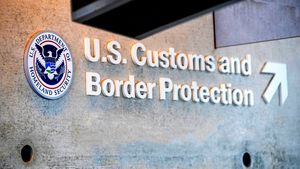San
Francisco has tentatively approved a program to provide
identification cards to illegal immigrants, transgender
people, and other residents who may be unable or
unwilling to get a state-issued driver's license.
The board of
supervisors, San Francisco's version of a city council,
voted 10-1 Tuesday to approve the program. Next week
it will take a final vote, which is considered a
formality. Mayor Gavin Newsom has said he intends to
sign the measure.
The
identification card program was modeled after one launched
this summer in New Haven, Conn., and is designed to
help residents without IDs access services and feel
safe dealing with police.
Similar programs
have been proposed in New York City and Miami, but so
far San Francisco is the biggest city to adopt one.
The supervisors
directed the city clerk to start issuing the ID cards
within nine months. The lone dissenter had concerns about
the cost to implement the program.
Supervisor Tom
Ammiano introduced the ID card concept after Congress
failed to adopt immigration reform legislation this summer
and following a series of federal immigration raids in
the Bay area.
''Our city just
can't stand by while our federal government takes no
action to address the safety needs of our community,'' he
said. ''If our friends and neighbors are not fully
able to participate with us in civic life, we all lose
in the end.''
The program,
scheduled to go into effect next August, will charge adults
$15 for each card and children $5 to defray costs, which are
expected to run between $423,000 and $1.1 million
during the first year.
To be eligible,
residents would have to produce an existing photo ID,
such as a passport or foreign driver's license, as well as a
recent utility bill or bank statement. The recipients
cannot use the IDs to drive; they would still need a
state driver's license.
Government
agencies and nonprofit groups that receive city funds would
be required to accept the cards as valid
identification and proof of residency except for
hiring or other areas where doing so conflicts with
federal or state laws.
Some of the
services that ID holders could use are libraries, public
golf courses, health clinics, and cultural
institutions that give resident discounts such as
museums and zoos, Ammiano said.
The cards,
available to the city's 750,000 residents, are intended for
undocumented residents who are ineligible for driver's
licenses, senior citizens who no longer drive, and
transgender people whose driver's licenses no longer
reflect their appearances.
Unlike in New
Haven, where anti-immigration groups actively opposed the
cards, the ID measure has not met much dissent in San
Francisco. Labor unions, advocates for the homeless,
and immigrant rights activists all lobbied for its
passage.
Kica Matos, the
community services administrator for New Haven,
population 125,000, said the city, which expected to issue
about 5,000 municipal IDs in one year, has issued
4,631 in 3 1/2 months. (Lisa Leff, AP)













































































